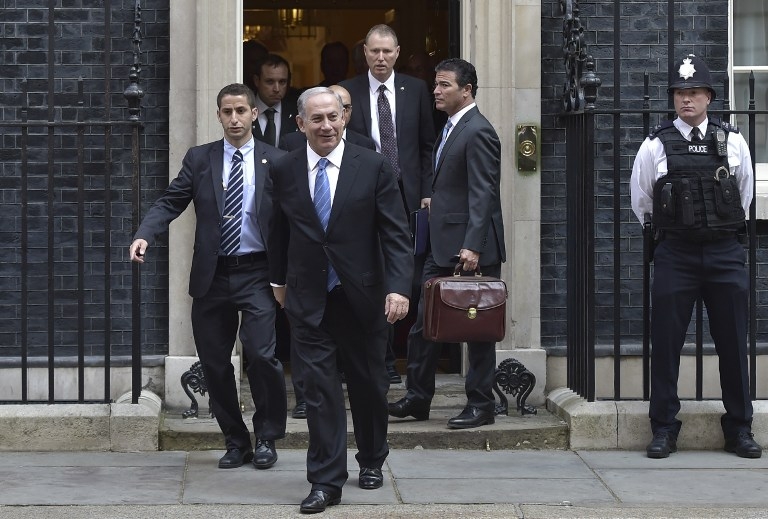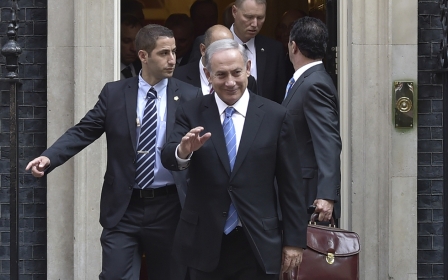Israel's paranoid tactics have led to the Masot embassy scandal

It’s the job of foreign embassies and the staff who work in and for them to pursue the interests of the countries they represent.
Maintaining good relations with the government of the state in which they are located, developing trading links, facilitating cultural exchange, seeking support and understanding during periods of violent political or military conflict, encouraging positive ties with those in the host country with whom they have diasporic connections, be they national, ethnic or religious - all this, and more, is the stuff of presenting your country in as best a light as possible. And pursuing this by arranging visits by journalists, politicians and major cultural figures is perfectly acceptable.
But the question is: where do you draw the line between legitimate engagement of this kind and unacceptable interference in the political processes of your host state?
This is a particularly acute issue where Israel and the UK are concerned, given that Israel is or has been in violent conflict with its neighbours, with elements of its indigenous population and with the population of lands it has occupied since 1967; that the UK formally regards Jewish settlements in the West Bank as illegal; and that there is a history of a difficult relationship with the country that was involved in controversial and contradictory ways in bringing the Israeli state into being.
Yossi Melman: Israeli 'black ops' against foreign governments are immoral and paranoid
And it’s quite clear, as two investigative journalists in particular, Peter Oborne and Yossi Melman - backed by many others - have shown, that some of the activity the now ditched Israeli embassy official Shai Masot was involved in, undoubtedly crossed that line.
The judgement of Melman, a highly respected award-winning Israeli security analyst, that Israel’s sanctioning of the activity of Masot and his ilk is “immoral”, “paranoid” and “infringes on the sovereignty of foreign governments”, cannot be dismissed as anti-Semitic fantasy or biased exaggeration.
UK's loyalty to Israel
There is a double danger here, however. First, in getting bogged down in the minutiae, much of which is now being deployed by those who seek to paint Masot as an incompetent, rogue, bragging, insignificant temp, speaking without the approval of ambassador Mark Regev, and thereby legitimising Foreign Secretary Boris Johnson’s statement that the affair is now “closed”.
Second, in making far-fetched claims that a body like the Conservative Friends of Israel parliamentary group is actually determining UK Middle East policy.
Israel sought to secure Jewish diaspora support by playing a hegemonic role in the monitoring, combating and publicising of the problem of anti-Semitism
The reality is far more worrying in that successive British governments over the last 20 years have deemed it to be in British interests to tacitly support the increasingly extreme nationalist policies of right-wing Israeli governments, and to buy into the Israeli narrative that any level of hostility to Israel is anti-Semitic. To understand the significance of the Masot affair, we must understand the wider context.
For those of us who have had an analytical interest in the development of pro-Israel lobbying - by Israeli officials, Jewish communal organisations and non-Jewish friends of Israel groups of various kinds - these latest developments come as no surprise.
My past personal experience working in the Jewish community as founding director of a policy think tank, the Institute for Jewish Policy Research (JPR), dealing with issues such as anti-Semitism and the way Jewish and other religious and ethnic groups pursue their collective interests, brought me into close contact with this world.
And what I have observed is a pattern of Israeli behaviour, initially developing in a rather haphazard, fitful and unprofessional way, but going back at least 25 years, and increasingly coordinated with the establishment organisations of the Jewish community.
Israel refocuses on anti-Semitism
In the first decades of the state of Israel, the country’s political leaders paid very little attention to the issue of current anti-Semitism.
To acknowledge that, despite the Holocaust, anti-Semitism never went away, and indeed that there was a resurgence with the revival of far-right groups in the late 1940s and 1950s, would have disturbed the narrative of the success of Zionism, the fulfillment of which was supposed to put an end to anti-Semitism.
MORE: The UK's new anti-Semitism definition is more about protecting Israel than British Jews
Prime Minister David Ben Gurion’s policy was to assert that Israel had a responsibility for the welfare of diaspora Jewish communities worldwide, but defining what that meant was for Israel to decide.
Thus, with friendly states in short supply, Ben Gurion would put developing relations between Israel and other states above the concerns Jewish communities in those states had about anti-Jewish activity, whether state-sponsored or not. Argentina and South Africa are prime examples.
But after the 1967 war, as Israel’s international position deteriorated and the Palestinian national movement grew and gained increasing international support, and right-wing Zionist governments came to dominate Israeli politics, this policy changed.
So that by the late 1980s and early 1990s, Israel sought to secure Jewish diaspora support by playing a hegemonic role in the monitoring, combating and publicising of the problem of anti-Semitism.
And one of its methods was to place Mossad operatives in innocuous-sounding positions in Israeli embassies tasked with stoking concern about the post-1989 resurgence of anti-Semitism in former communist countries and galvanising groups of young Jews around the issue so as to encourage them to see Israel, Zionism and emigration - aliya - to the country as the answer.
Hijacking Jewish diaspora groups
Just as Shai Masot’s “Israel right or wrong” activities setting up Jewish organisations runs counter to the real interests of British Jews as an integral part of British society, so his predecessors began the process by also wishing to hijack Jewish communal priorities to serve Israeli interests.
Israel once again exploited fear of anti-Semitism as an effective political tool and hasn’t looked back since
The think tank I ran sought to assess anti-Semitism as objectively and as free from political influences as possible. We were appalled by the Israeli instrumentalisation of anti-Semitism and battled against it as hard as we could. For a while, during the Oslo Accord years, it no longer suited Israel to engage with diaspora Jews in this way.
But post-2000, as the so-called “peace process” ran aground, right-wing Israeli opposition to Palestinian national aspirations mounted and “new anti-Semitism” theory - the notion that Israel was “the Jew among the nations” and therefore hostility to it was synonymous with anti-Semitism - came to be the new orthodoxy. Israel once again exploited fear of anti-Semitism as an effective political tool, and hasn’t looked back since.
Conflating BDS and anti-Semitism
From the Al Jazeera material released so far, we get a sense of how integral anti-Semitism is in the discourse of those lobbying for Israel: the remarks of ambassador Regev implying that left-wing pro-Palestinian activists are likely to be anti-Semitic; the way Israel-supporting Labour MPs appear automatically to assume left-wing activists at the 2016 Labour Party conference questioning Zionism are expressing anti-Semitism; and the alleged involvement of the Labour Friends of Israel parliamentary officer Michael Rubin in an attempt to oust Malia Bouattia, who opposes what she calls “Zionist politics”, from her position as president of the National Union of Students.
But we see this most starkly in the concerted campaign to brand as anti-Semitic the Palestinian civil society campaign for boycott, divestment and sanctions (BDS) against Israel, a fundamentally non-violent form of struggling for Palestinian rights (and incidentally supported by the NUS).
MORE: Israeli embassy's 'take down' tactics shouldn't distract from its crimes- and UK complicity
Whatever its real effect on Israel, the very considerable growth in pro-BDS political activism, particularly on university campuses, has spooked the Israeli government and established Jewish organisations throughout Jewish communities.
The Netanyahu government took a strategic decision to devote huge resources to fighting BDS using the anti-Semitism charge.
In America, Sheldon Adelson and Haim Saban, major donors to Jewish causes, teamed up with other donors to establish a $50m fund to counter the BDS campaign using, among other means, the State Department’s definition of anti-Semitism in courts and state legislatures to outlaw the adoption of BDS policies on university campuses.
Here in the UK, much of the focus of bodies like BICOM, the Board of Deputies of British Jews, anti-anti-Semitism organisations and Zionist groups, is focused on demonising BDS.
All of the above forces were greatly encouraged by the adoption of a definition of anti-Semitism in May 2016 by the 31-country International Holocaust Remembrance Association (IHRA), which provides examples of discourse on Israel that could be deemed anti-Semitic and which could be extended to BDS. And in the last month, the British government announced that it was making that IHRA definition its own formal anti-Semitism definition.
Western complicity
It would be wrong to conclude, however, that this “misuse” of anti-Semitism is being foisted on unwilling governments by pro-Israel lobbying groups.
While on paper, most Western governments may support the two-state solution to the Israel-Palestine conflict, regard Jewish settlements in the West Bank as a barrier to a peace settlement and approved the passing of UN Security Council resolution 2334 which stated that settlement activity is a “flagrant violation of international law” and has “no legal validity”, in reality they have downgraded their concern about the issue since they are far more preoccupied with other crises, particularly those they link to Islamist or jihadi terrorism - all too often more loosely described in dehumanising terms as “Muslim terrorism”.
And in their struggle against these violent trends they regard Israel not only as a key ally but as standing in the very front line - a characterisation that centre-right and far-right political and civil society groups in Israel are happy to embrace.
The wonder is, given the pro-Israel default position of the Tory government and the vast majority of the Tory parliamentary party, why would Israel, as represented by an ambassador who surely knew and approved of the activities of Shai Masot, act as if they are the enemy or even get so exercised by one junior government minister, Alan Duncan, who strongly and publicly supports Palestinian rights.
And so we return again to Melman’s reference to the paranoid style of the Israeli government and its supporters. The more powerfully they can exert themselves against their perceived enemies and the more ability they have to act with impunity in engineering a creeping annexation of the West Bank, the more they see the world as eternally against them. Such would seem to be the “principles” that guide the thinking and operations of Israel’s embassy.
- Antony Lerman is the former Director of the Institute for Jewish Policy Research and currently Senior Fellow at the Bruno Kreisky Forum for International Dialogue in Vienna. Based in London, he has written widely on anti-Semitism, Israel-Palestine, multiculturalism and international Jewish politics for the Guardian, Independent, Haaretz, New York Times, openDemocracy, Jewish Chronicle and other leading periodicals. He is the author of 'The Making and Unmaking of a Zionist: A Personal and Political Journey' (Pluto Press 2012) and Editor of 'Do I Belong? Reflections from Europe' (Pluto Press, forthcoming May 2017) His tweets @tonylerman.
The views expressed in this article belong to the author and do not necessarily reflect the editorial policy of Middle East Eye.
Photo: Israeli Prime Minister Benjamin Netanyahu (C) leaves 10 Downing Street with members of his delegation after a meeting with British Prime Minister David Cameron in London on 10 September 2015 (AFP)
New MEE newsletter: Jerusalem Dispatch
Sign up to get the latest insights and analysis on Israel-Palestine, alongside Turkey Unpacked and other MEE newsletters
Middle East Eye delivers independent and unrivalled coverage and analysis of the Middle East, North Africa and beyond. To learn more about republishing this content and the associated fees, please fill out this form. More about MEE can be found here.





